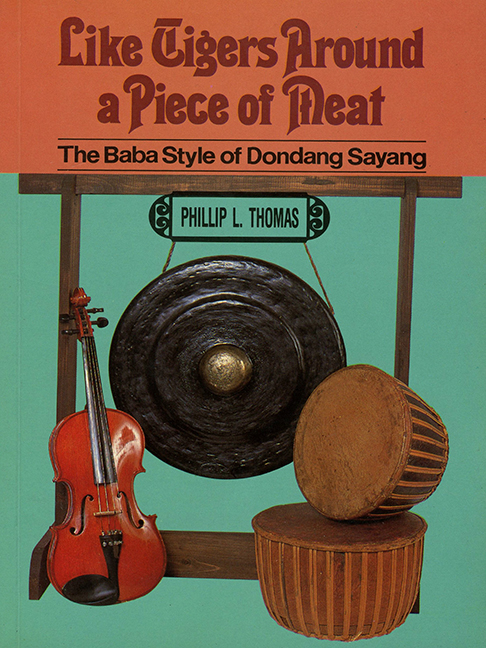2 - THE TAJUK SYSTEM
Published online by Cambridge University Press: 21 October 2015
Summary
The low level of Baba participation in Malaysian and Singaporean Malay broadcasting leads newcomers to assume that Dondang Sayang is today an art performed primarily by Malays. What people see on the television screen are gently swaying singers melodically rendering poems-which exhibit mild joking. The graceful, undulating movements joget dancers fill space, giving no differentiation to their dance regardless of whether the poems are about love or derision. Listeners from outside the Malay and Baba communities admit to finding little of interest: the performance is, to them, soporific at best. There are present neither Baba Boon Kim Yew's tigers nor their piece of meat. The pussy cats have taken control. Or so the naive listener assumes.
Aesthetic systems arc transparent to their users while contrary systems are deemed untrue or unnatural, if they are thought to exist at all. Dondang Sayang, practised by Malays, Babas, and mixed groups of Malays and Babas, with occasional support by Indians, presents a particularly interesting case where a single art form is seen through multiple aesthetic standards. Early Western investigators of Malay poetry reported attempts to elicit from the Malays interpretations and explanations of pantun. Most failed to obtain answers meaningful to their European culture's idea of what poetry is all about. What they did not note was that Malays have no tradition of discussing poetry or of making explicit rules for its creation. Today we would not say that Malays have no rules, but that the rules are implicit and internalized, formed through an apprenticeship style of modelling. It could be pointed out that most Greek epic, lyric, and tragedy had been created and passed away before Aristotle wrote his Poetics. Traditionally, Malays make poetry; they do not analyse it.
The one aberration to this maxim is that there are numerous books designed for the school system which are based on colonial scholars' writings.
- Type
- Chapter
- Information
- Like Tigers Around a Piece of MeatThe Baba Style of Dondang Sayang, pp. 11 - 15Publisher: ISEAS–Yusof Ishak InstitutePrint publication year: 1986



